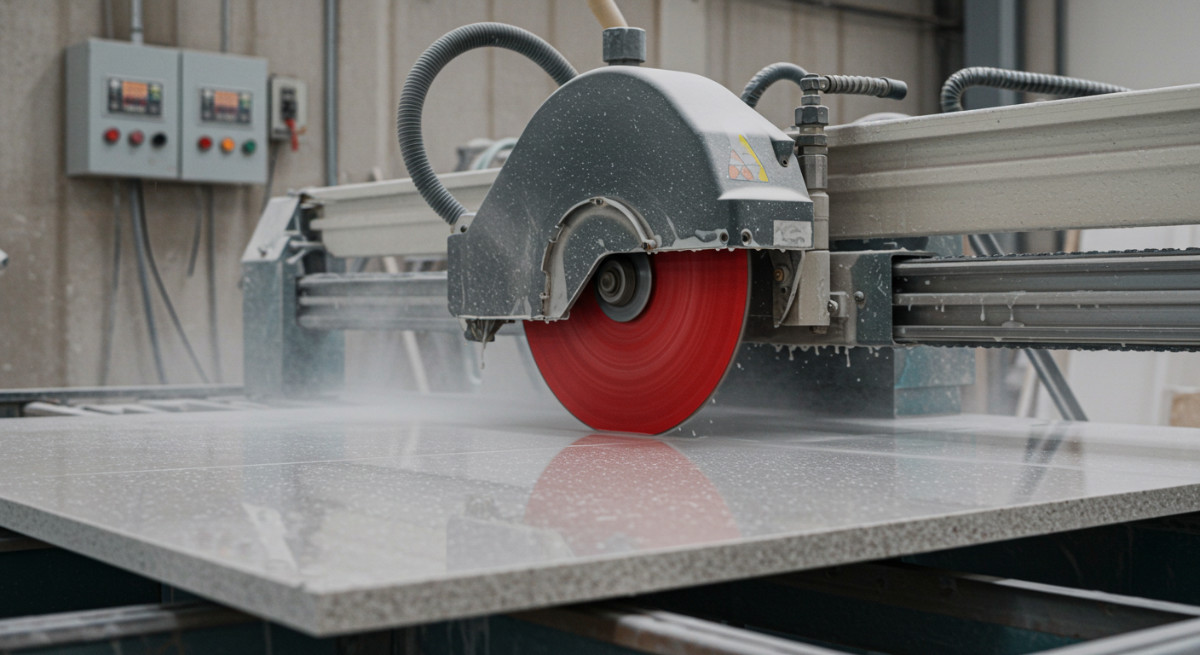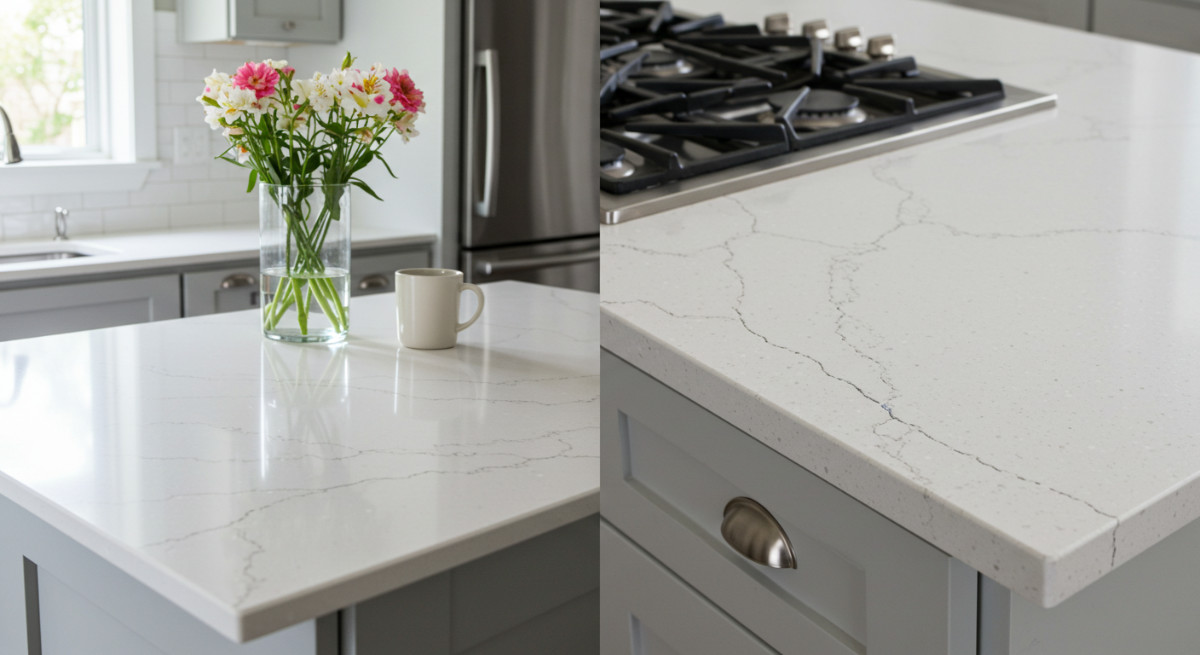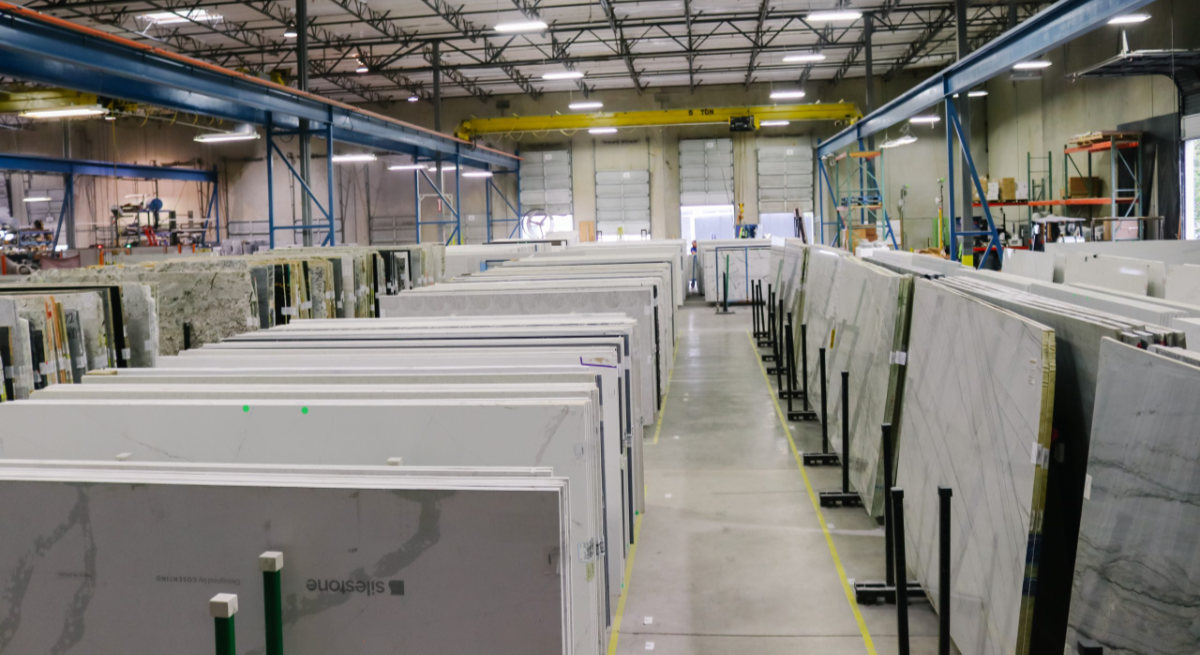Quartz countertops are man-made engineered stone. Manufacturers combine crushed natural quartz with resins and pigments.
This matters when deciding between countertop materials. Natural stones like granite or marble need regular sealing. Quartz doesn’t.
I’ll show you:
- How manufacturers create quartz countertops
- The pros and cons of quartz countertops
- How quartz compares to natural quartzite
- Simple care tips that protect your investment
Choosing the wrong countertop can cost you $4,000 and years of frustration. Keep reading to avoid the costly mistakes.
Are Quartz Countertops Man-Made?
Yes, quartz countertops are 100% man-made. Manufacturers combine natural quartz with synthetic materials to create an engineered stone.
You get the best of both worlds with quartz countertops. They use about 90% natural quartz mixed with 10% polymer resins and pigments. This blend creates a surface harder than most natural stone countertops.
Many homeowners choose quartz for its durability and simplicity. You get the look of natural stone without the extra work.
What Are Quartz Countertops Made Of?
Quartz countertops contain about 90-95% natural quartz mixed with 5-10% polymer resins and pigments.
Quartz manufacturers grind these minerals into various particle sizes. The resin binds everything together. Pigments add color and visual effects.
High pressure and heat compact this mix into a non-porous, durable surface that mimics natural stone.
Unlike natural stone slabs, quartz countertops have a consistent composition throughout. This provides reliable strength and stain resistance in every inch of your countertop.
Here’s what’s in a typical quartz countertop:
| Component | Percentage | Purpose |
|---|---|---|
| Natural quartz | 90–95% | Provides hardness and durability |
| Polymer resins | 5–10% | Binds particles, creates non-porous surface |
| Pigments | <1% | Adds color and visual effects |
| Optional additives | Varies | Decorative elements (glass, metallic flakes) |
How Are Quartz Countertops Made?

Here’s how raw quartz becomes your beautiful kitchen countertop. The process combines mining, chemistry, and precision engineering.
1. Crush Natural Quartz into Fine Particles
Miners extract quartz rock from the earth. Then, machines crush the quartz into small grains and dust. Different grain sizes create texture in the final quartz product.
2. Blend Quartz with Resin and Color Pigments
Workers mix the crushed quartz with polymer resins and color pigments. Some blends include glass or metal flecks for unique visual effects. This creates the specific look and style of each quartz brand.
3. Pour Quartz Mix into a Slab Mold
The mixture goes into large molds that shape the quartz slabs. Standard sizes run about 120 × 55 inches. The thickness ranges from 2 to 3 centimeters.
4. Remove Air with Vacuum and Vibration
Machines create a vacuum to pull out air bubbles. Vibration ensures the mixture spreads evenly throughout the mold. This process provides a solid slab without weak spots or voids.
5. Press the Slab with Extreme Force
Industrial presses apply over 100 tons of pressure to compact the material. This compression makes the slab dense and strong. The pressure forces the resin throughout the quartz.
6. Cure the Slab in an Industrial Oven
The quartz slab bakes at around 90°C (194°F) for 30-40 minutes. This heat activates the resins. The quartz and polymers bond together permanently.
7. Cool and Harden the Slab
The quartz slab cools in a controlled environment. This cooling process prevents warping or cracking. It also lets the material fully harden and stabilize.
8. Trim Edges and Level Surface
Precise cutting tools trim the quartz slab edges. Grinding machines level the top and bottom surfaces. This process creates flat and uniform slabs ready for finishing.
9. Polish or Texture the Surface
Diamond tools polish the slab to a glossy shine. Options include high-gloss polish, matte honed finish, or textured surfaces. The finish changes how the countertop looks, reflects light, and feels.
10. Inspect Slab and Ship to Fabricators
Quality control teams check each slab for defects. Approved slabs ship to fabricators like Precision Countertops. Our specialists cut the slabs to fit your specific kitchen or bathroom design.
Quartz Countertops Overview (Quick Facts)
Looking for a quick comparison of what matters most? Here are some facts about quartz countertops to make an informed decision:
| Feature | Details |
|---|---|
| Material | Engineered stone (man-made quartz) |
| Composition | 90–95% quartz, 5–10% resins and pigments |
| Durability | High (7 on Mohs hardness scale) |
| Heat Resistance | Moderate (use trivets for hot pots) |
| Porosity | Non-porous (0% water absorption) |
| Maintenance | Low (simple cleaning, no sealing needed) |
| Best For | Kitchens, bathrooms, high-traffic areas |
| Colors | Vast range from solid colors to natural stone looks |
| Thickness | Typically 2cm or 3cm |
Quartz countertops deliver practical benefits that natural stone can’t match. The non-porous surface stops bacteria growth and resists stains.
You never need to seal quartz countertops. A quick wipe with soap and water keeps your countertop looking new. This makes them perfect for busy families and anyone who wants beauty without the upkeep.
Ready to upgrade your space? Explore our stunning quartz collections today →
Quartz Countertops Pros and Cons

Stop living with countertops that stain, crack, and demand endless care. Quartz delivers a luxurious look with no upkeep.
Pros of Quartz Countertops
- Extremely durable – Resists scratches, chips, and cracks better than natural stone.
- Non-porous surface – Never needs sealing and stops bacterial growth.
- Stain-resistant – Coffee, wine, and cooking oils wipe away easy.
- Consistent appearance – No unpredictable variations like in natural stone.
- Low maintenance – Simple cleaning with only soap and water.
Cons of Quartz Countertops
- Heat sensitivity – Intense heat from pots and pans can cause damage.
- Higher price point – More expensive than laminate countertop options.
- UV sensitivity – May fade when used outdoors or in direct sunlight.
- Visible seams – Larger kitchens need multiple slabs with noticeable joins.
- Professional installation required – Not a DIY-friendly project.
Our Precision Process makes installation seamless. We take care of everything from design to installation. → See how it works
Quartz vs Quartzite Countertops: What’s the Difference?
Don’t confuse engineered quartz with quartzite stone. Here are the key differences between quartz and quartzite countertops:
| Feature | Quartz Countertop | Quartzite Countertop |
|---|---|---|
| Origin | Man-made in factories | Natural stone formed over millions of years |
| Composition | 90–95% crushed quartz + 5–10% resins | 100% metamorphic rock (compressed sandstone) |
| Porosity | Non-porous (0% absorption) | Porous (requires regular sealing) |
| Maintenance | Wipe clean with soap and water | Needs sealing every 1–2 years |
| Appearance | Consistent color and pattern | Unique, natural variations |
| Heat Resistance | Moderate (use trivets) | Excellent (high heat resistance) |
| Hardness | 7 on Mohs scale | 7–8 on Mohs scale (slightly harder) |
| Color Options | Unlimited (including solid colors) | Limited to natural stone colors |
Final Take
- Choose quartz for a consistent look, no sealing, and simple cleaning.
- Choose quartzite for natural patterns, and don’t mind sealing every year.
The choice comes down to this: Do you want easy care or natural stone variation?
How to Choose Quartz Countertops

Avoid costly regrets. Use these expert tips to choose quartz that fits your space, lifestyle, and budget.
1. Quartz Countertop Colors
The wrong color can be costly to replace within 5 years. Choose these options:
- White and gray remain the most popular. They brighten rooms and pair with most cabinets.
- Neutral colors stay timeless for decades.
- Bold colors make statements but may feel dated faster.
Think long-term. Choose a color you’ll still love in ten years.
Also Read: Three Ways to Make a White Quartz Choice
2. Quartz Patterns
Pick a pattern that complements your style. Options to consider:
- Veining mimics a marble look with elegant movement.
- Speckles add depth while concealing daily use marks.
- Solid colors create modern lines for minimalist appeal.
Consider how the pattern will look under daily lighting and wear over time.
3. Quartz Finishes
Your finish choice affects appearance and daily care. Here are the tradeoffs:
- Polished finishes reflect light and wipe clean in seconds.
- Honed surfaces feel luxurious but show every fingerprint.
- Textured finishes hide marks but trap grime in crevices.
Each finish changes how often you’ll need to clean.
Also Read: Veined Quartz Countertops That Mimic the Look of Natural Stone
4. Edge Profile Options
Edge profiles influence style and function. What to know:
- Straight edges offer a clean and modern look.
- Bullnose edges soften the space with rounded curves.
- Ogee or beveled edges add traditional detail and visual depth.
This small detail adds character and ties the whole look together.
5. Quartz Durability
The quality of quartz affects its resistance to scratches, stains, and heat. The material mix plays a key role:
- More quartz means greater hardness and scratch resistance.
- Higher resin improves stain resistance but weakens heat tolerance.
- Lower resin provides better heat resistance but increases scratch risk.
- Balanced resin levels improve durability and reduce cracking from high heat.
Ask your countertop installer for the right quartz-to-resin ratio. This will help you find your perfect balance.
6. Stain Resistance
Quartz surfaces are non-porous and resist stains. But, some foods can cause lasting discoloration. Keep these points in mind:
- Light colors show stains more than darker tones.
- Wine, turmeric, and tomato sauce can stain if left too long.
- Wipe spills within 10 minutes to prevent discoloration.
Ask for samples and test them with foods you use often. It’s the best way to choose a surface that fits your cooking habits.
7. Quartz Countertop Brands
Premium brands deliver quality quartz worth the investment. Here’s what sets them apart:
- Cambria, Caesarstone, or Silestone lead with extensive color and pattern options.
- Trusted manufacturers offer more reliable warranties and customer support.
- Top brands use precise fabrication for consistent durability and appearance.
Budget brands may cut corners on materials or fabrication. Lower-quality quartz can wear out faster, while premium brands hold up for decades.
8. Hiring a Quartz Installer
Installing quartz takes skill, precision, and experience. Don’t trust your investment to anyone. Here’s what to look for in a reliable installer:
- Years of hands-on countertop experience
- Accurate measurement and templating process.
- Verified customer reviews and photo galleries.
- Transparent pricing and detailed quotes. No hidden fees.
Precision Countertops handles everything from start to finish. We design, measure, and install your countertops.
The entire Precision process happens in-house to ensure quality, consistency, and lasting results.
Why Choose Quartz Countertops?
Quartz gives you the beauty of natural stone without the added care. It resists stains, won’t chip or scratch, and wipes clean fast.
Ready to upgrade your kitchen or bath? Precision Countertops makes your project stress-free. We guide you from design to installation.
Homeowners in the Pacific Northwest have trusted us for over 35 years. They value our quality and service. You get expert guidance, honest answers, and lasting results.
Visit our Wilsonville showroom today. See full slabs, compare colors, and talk to a designer.
FAQs About Quartz Countertops
Answers to common questions about quartz countertops.
What Is Quartz Countertops?
Quartz countertops are engineered surfaces made from natural quartz crystals mixed with resins and pigments. They’re non-porous, resistant to stains, and do not need sealing. Unlike natural stone, quartz offers consistent color and pattern options.
Are Quartz Countertops Durable?
Yes, quartz countertops are durable. Quartz resists scratches, stains, and heat better than many natural materials.
The non-porous surface prevents bacteria buildup and eliminates the need for sealing. This makes quartz a strong, hassle-free option for kitchens and bathrooms.
Are Quartz Countertops Heat Resistant?
Quartz countertops are heat resistant but not heatproof. They can handle brief exposure to moderate heat, such as a warm plate.
However, putting hot pots or pans on quartz can lead to discoloration or cracks. Always use trivets or hot pads to protect the surface.
Are Quartz Countertops Porous?
No, quartz countertops are non-porous. The resin binding creates a solid surface that resists stains, bacteria, and moisture. This is an advantage over natural stone options that need regular sealing.
How Thick Are Quartz Countertops?
Quartz countertop slabs come in 2cm (¾”) and 3cm (1¼”) thickness.
Most kitchen countertop installations use 3cm quartz for durability and style.
Does Quartz Countertops Stain?
Yes, quartz countertops are stain-resistant but not stainproof. The non-porous surface resists liquids like wine, coffee, and oil.
Harsh chemicals or permanent dyes can discolor the surface if left for too long. Clean spills as soon as they occur to prevent stains and keep the surface looking new.
How to Care for Quartz Countertops?
Quartz is low-maintenance but still needs the proper care:
- Clean with mild soap and warm water. Skip harsh cleaners.
- Wipe spills within ten minutes to stop stains from setting.
- Use a cutting board. Knives can scratch the surface.
- Place hot pans on a trivet. Heat can cause the resin to crack or discolor.
- Avoid abrasive scrubbing pads. They wear down the finish.
Do You Need to Seal Quartz Countertops?
No, quartz countertops do not need sealing. The surface is non-porous and does not absorb liquids or stains.
This built-in resistance means you don’t need to reseal it like granite and marble countertops.